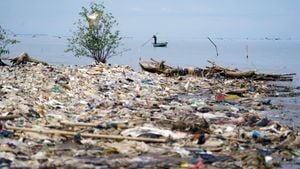The United Nations has recently underscored its commitment to global cooperation with the introduction of the Pact for the Future, aimed at tackling some of today’s most pressing global issues, including climate change, inequality, and technological disruption. Passed by the General Assembly in September 2024, the pact emphasizes the need for reform and collaboration among nations, signaling renewed hope for sustainable development.
One of the most significant highlights of the Pact is its ambitious climate agenda, which includes commitments to limit global temperature rise to under 1.5°C and achieving net-zero emissions by 2050. These targets reflect the urgent call from scientists and advocates alike who warn of the dire consequences of unabated climate change. The agreement also recognizes the disproportionate effects of climate impacts on poorer nations, which bear the brunt of destructive storms, droughts, and other disasters yet contribute the least to climate change. Importantly, it promises to funnel financial resources toward these vulnerable regions to help them build resilience and adapt to changing conditions.
Financial reforms are central to the Pact, aiming to remodel global financial systems to reflect and address the needs of developing countries. Historically, countries such as those found online at the International Monetary Fund (IMF) and the World Bank have often sidelined these nations, limiting their access to necessary funding for sustainable development initiatives. With this pact, there’s hope for balancing these inequalities and providing more opportunities for poorer regions to secure investments and resources.
Digital governance, another key area of focus, introduces the Global Digital Compact. This framework seeks to promote universal internet access and regulate the responsible use of technologies like artificial intelligence (AI), tackling potential abuses and safeguarding human rights along the way. The pact also invites young generations to participate, introducing the Declaration on Future Generations, aimed at embedding their voices and perspectives within policymaking processes. This inclusion is pivotal for fostering innovative solutions to the complex challenges of climate change and technological advancement.
Noteworthy, even with significant support garnered for the Pact for the Future, it faced skepticism from several quarters. Countries like Russia and Belarus voiced concerns over perceived expansions of UN authority, particularly concerning security measures. Iran and Venezuela also expressed dissatisfaction with negotiations, which some believe sidelined non-Western concerns. Nevertheless, the resolution was adopted without formal vote, reflecting broader recognition of the urgent need for coordinated global action.
The pact’s introduction aligns with initiatives from global institutions seeking to bolster climate tech solutions. For example, HSBC recently revealed its collaborative efforts with Google Cloud, dedicATING $1 billion to support climate tech startups. This partnership is intended to provide start-ups with the financial backing and resources they need to innovate and grow within the field of climate technology.
HSBC’s commitment, led by Natalie Blyth, aims to offer venture debt and networking opportunities, along with crafting directories of providers who can guide startups toward achieving net-zero emissions. The bank plans to not only support these new ventures but also to achieve its own net-zero emissions goal by 2030 and reduce financed emissions by 2050. This endeavor reflects the broader trend among financial institutions to take climate change more seriously, adapting their operations to create sustainable outcomes.
The partnership between HSBC and Google Cloud is especially interesting considering Google’s role as an infrastructure provider for numerous innovative startups. Through its Google Cloud Ready – Sustainability (GCRS) program, Google is facilitating the adoption of sustainability technologies among businesses and governments. Their collaborative approach ensures significant funding and practical support for climate-conscious entrepreneurs, presenting new opportunities to accelerate the transition to greener economies.
Of course, the road to actualizing these commitments is fraught with hurdles. The political resistance from major nations poses one of the most substantial challenges. To successfully execute the goals set forth by the Pact for the Future, major powers must come together, shedding rivalries and aligning their strategies toward common objectives. The Security Council reform is another significant sticking point. Engaging with members who wield veto power poses challenges to consensus-building, especially when entrenched interests are involved.
Implementation also looms large as both ambitions outlined within the pact and deficits faced by developing nations will require resource mobilization. Despite promises of aid, skepticism remains over if and when the promised funds would be delivered. Financial and operational hurdles will need collaborative solutions, demanding genuine commitment from wealthier nations.
Further complicated by geopolitical tensions, such as the exigencies of the war in Ukraine, global cooperation where cooperation is needed faces strains. The reality is, some nations may prioritize national interests over collective goals, which only adds to the difficulty of establishing long-term climate agreements.
Meanwhile, the divide remains exacerbated by the industry’s reliance on fossil fuels, which still account for the majority of global energy consumption. These industries possess significant political influence, making it challenging to phase out fossil fuels quickly. Although discussions have been initiated at forums, including the recent climate conference hosted in Dubai, which framed the conversation around transitioning from fossil fuels, achieving consensus for action remains elusive.
Some posit the need for united action similar to the way the United States and the Soviet Union once banded together against outer-space threats. The idea encourages reframing the perspective on climate change, urging global leaders to work together earnestly rather than viewing one another as competitors.
Therefore, the prospect of implementing the Pact for the Future remains both optimistic and challenging. The cooperative efforts between major corporations like HSBC and tech giants like Google symbolize hope for fostering the innovation needed to solve pressing climate issues. The larger question now lies with nations working collectively to aid those most affected by climate extremes - the developing nations, who often have the least resources to address these obstacles.
Antonio Guterres, Secretary-General of the United Nations, struck the right chord as he remarked on the need for trust and collaboration among nations to succeed. His belief resonates strongly: without global cooperation, it’s unclear if any nation can adequately face the challenges presented by climate change. The stakes could not be more disconcerting; the world stands at the precipice, relying on cooperative actions to steer toward more sustainable futures.
Indeed, the urgency is palpable, and the commitments from the largest financial institutions are positive steps toward meaningful action. The dynamic reshaping of partnerships within climate technology heralds new opportunities, as governments and organizations look for viable paths forward amid varied challenges global society faces today.
The future hinges on how well we can leverage international collaboration and equitable financial systems geared toward sustainability. If nations can navigate the political intricacies and push forward with implementation, the Pact for the Future could potentially be transformative.
Moving forward, global leaders must refresh commitments, amplify cooperation, and rework financial frameworks to balance inequalities. Only then can the ambitions laid out within the Pact for the Future genuinely grant future generations the safety and sustainability they deserve, shielded from disasters looming on the climate horizon.



